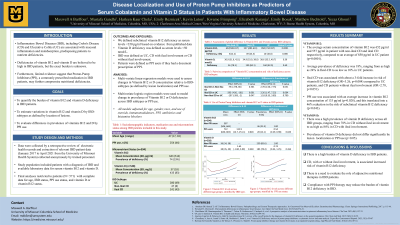Tuesday Poster Session
Category: IBD
P3623 - Disease Localization and Use of Proton Pump Inhibitors as Predictors of Serum Cobalamin and Vitamin D Status in Patients With Inflammatory Bowel Disease
Tuesday, October 24, 2023
10:30 AM - 4:00 PM PT
Location: Exhibit Hall

Has Audio

Maxwell Barffour, PhD
University of Missouri School of Medicine
Columbia, MO
Presenting Author(s)
Maxwell Barffour, PhD1, Mustafa Gandhi, MD2, Harleen Chela, MD1, Emily Reznicek, MD3, Kwame Frimpong, BSc4, Elizabeth Karanja, BSc1, Kevin Luton, BSc1, Emily Bosak, MD5, Matthew Bechtold, MD1, Yezaz Ghouri, MD6
1University of Missouri School of Medicine, Columbia, MO; 2University of Missouri-Columbia, Columbia, MO; 3University of Missouri School of Medicine, Columbia, MO; 4University of Missouri School of Medicine, Columbia, MO; 5University of Missouri School of Medicine, Columbia, MO; 6University of Missouri School of Medicine, Columbia, MO
Introduction: Inflammatory Bowel Diseases (IBD)- including Crohn’s Disease (CD) and Ulcerative Colitis (UC)- increase the risk for vitamin and mineral deficiencies. CD commonly affects the terminal ileum and can impair absorption of vitamin B12 and fat-soluble vitamins, particularly vitamin D. Evidence is lacking on how vitamin B12 and vitamin D are affected in a) non-ileal CD and b) UC. Furthermore, there is uncertainty on how B12 levels in CD and UC patients may be impacted by using Proton-Pump Inhibitors (PPI). In this study, we assessed differences in vitamin B12 and vitamin D by IBD type, lesion localization and PPI use.
Methods: Data were retrieved from the University of Missouri electronic health record system (Jan 2017-April 2022). Analyses included patients (aged 17-94 years) with a diagnosis of IBD, who had available data on Vitamin B12 and vitamin D levels. Three groups of IBD patients were defined using the IBD type and localization of lesions. These were a) non-ileal CD, b) Ileal-CD and c) UC. We used multivariate linear regression models with vitamins B12 or D status as outcome. Primary predictor variables were PPI use and IBD localization. We adjusted for potential confounders, including steroid and antibiotic use.
Results: We analyzed data from eligible IBD patients (n=677), including 306 (45%) with UC and 371 with CD (75 non-ileal [9%], 307 ileal-CD [46%]). About 42% of patients had a prescription for PPI. CD, with or without ileal involvement resulted in lower serum B12 levels compared to UC. Mean Serum B12 was higher in patients with UC (850 pg/mL) compared to Ileal-CD patients (557 pg/mL, p< 0.0001) and non-ileal CD patients (652 pg/mL, p=0.045). Serum vitamin D levels were significantly lower in the ileal- CD group compared to UC (34 nmol/L vs. 38 nmol/L; p=0.04). PPI use, independent of IBD localization, was associated with higher B12 levels. Vitamin B12 levels in IBD patients treated with PPI (734 pg/mL) was higher than non-PPI users (572 pg/mL; p=0.02). PPI use was not associated with vitamin D status in IBD patients (p=0.22).
Discussion: Our data demonstrates that CD, with or without ileal involvement is associated with lower vitamin B12 levels. This likely suggests that other disease processes, in addition to impaired absorption at the terminal ileum, are involved in the etiology of B12 deficiency in the IBD patients. Furthermore, our data suggest that PPI use in IBD patients may be associated with improved vitamin B12 levels.

Disclosures:
Maxwell Barffour, PhD1, Mustafa Gandhi, MD2, Harleen Chela, MD1, Emily Reznicek, MD3, Kwame Frimpong, BSc4, Elizabeth Karanja, BSc1, Kevin Luton, BSc1, Emily Bosak, MD5, Matthew Bechtold, MD1, Yezaz Ghouri, MD6. P3623 - Disease Localization and Use of Proton Pump Inhibitors as Predictors of Serum Cobalamin and Vitamin D Status in Patients With Inflammatory Bowel Disease, ACG 2023 Annual Scientific Meeting Abstracts. Vancouver, BC, Canada: American College of Gastroenterology.
1University of Missouri School of Medicine, Columbia, MO; 2University of Missouri-Columbia, Columbia, MO; 3University of Missouri School of Medicine, Columbia, MO; 4University of Missouri School of Medicine, Columbia, MO; 5University of Missouri School of Medicine, Columbia, MO; 6University of Missouri School of Medicine, Columbia, MO
Introduction: Inflammatory Bowel Diseases (IBD)- including Crohn’s Disease (CD) and Ulcerative Colitis (UC)- increase the risk for vitamin and mineral deficiencies. CD commonly affects the terminal ileum and can impair absorption of vitamin B12 and fat-soluble vitamins, particularly vitamin D. Evidence is lacking on how vitamin B12 and vitamin D are affected in a) non-ileal CD and b) UC. Furthermore, there is uncertainty on how B12 levels in CD and UC patients may be impacted by using Proton-Pump Inhibitors (PPI). In this study, we assessed differences in vitamin B12 and vitamin D by IBD type, lesion localization and PPI use.
Methods: Data were retrieved from the University of Missouri electronic health record system (Jan 2017-April 2022). Analyses included patients (aged 17-94 years) with a diagnosis of IBD, who had available data on Vitamin B12 and vitamin D levels. Three groups of IBD patients were defined using the IBD type and localization of lesions. These were a) non-ileal CD, b) Ileal-CD and c) UC. We used multivariate linear regression models with vitamins B12 or D status as outcome. Primary predictor variables were PPI use and IBD localization. We adjusted for potential confounders, including steroid and antibiotic use.
Results: We analyzed data from eligible IBD patients (n=677), including 306 (45%) with UC and 371 with CD (75 non-ileal [9%], 307 ileal-CD [46%]). About 42% of patients had a prescription for PPI. CD, with or without ileal involvement resulted in lower serum B12 levels compared to UC. Mean Serum B12 was higher in patients with UC (850 pg/mL) compared to Ileal-CD patients (557 pg/mL, p< 0.0001) and non-ileal CD patients (652 pg/mL, p=0.045). Serum vitamin D levels were significantly lower in the ileal- CD group compared to UC (34 nmol/L vs. 38 nmol/L; p=0.04). PPI use, independent of IBD localization, was associated with higher B12 levels. Vitamin B12 levels in IBD patients treated with PPI (734 pg/mL) was higher than non-PPI users (572 pg/mL; p=0.02). PPI use was not associated with vitamin D status in IBD patients (p=0.22).
Discussion: Our data demonstrates that CD, with or without ileal involvement is associated with lower vitamin B12 levels. This likely suggests that other disease processes, in addition to impaired absorption at the terminal ileum, are involved in the etiology of B12 deficiency in the IBD patients. Furthermore, our data suggest that PPI use in IBD patients may be associated with improved vitamin B12 levels.

Figure: Figure 1: Vitamin B-12 Status in IBD patients stratified by IBD type and localization.
Footnote: UC= Ulcerative Colitis; Ileal CD= Crohn’s Disease with ileal involvement; Non-ileal CD= Crohn’s disease without ileal involvement.
Footnote: UC= Ulcerative Colitis; Ileal CD= Crohn’s Disease with ileal involvement; Non-ileal CD= Crohn’s disease without ileal involvement.
Disclosures:
Maxwell Barffour indicated no relevant financial relationships.
Mustafa Gandhi indicated no relevant financial relationships.
Harleen Chela indicated no relevant financial relationships.
Emily Reznicek indicated no relevant financial relationships.
Kwame Frimpong indicated no relevant financial relationships.
Elizabeth Karanja indicated no relevant financial relationships.
Kevin Luton indicated no relevant financial relationships.
Emily Bosak indicated no relevant financial relationships.
Matthew Bechtold indicated no relevant financial relationships.
Yezaz Ghouri indicated no relevant financial relationships.
Maxwell Barffour, PhD1, Mustafa Gandhi, MD2, Harleen Chela, MD1, Emily Reznicek, MD3, Kwame Frimpong, BSc4, Elizabeth Karanja, BSc1, Kevin Luton, BSc1, Emily Bosak, MD5, Matthew Bechtold, MD1, Yezaz Ghouri, MD6. P3623 - Disease Localization and Use of Proton Pump Inhibitors as Predictors of Serum Cobalamin and Vitamin D Status in Patients With Inflammatory Bowel Disease, ACG 2023 Annual Scientific Meeting Abstracts. Vancouver, BC, Canada: American College of Gastroenterology.
